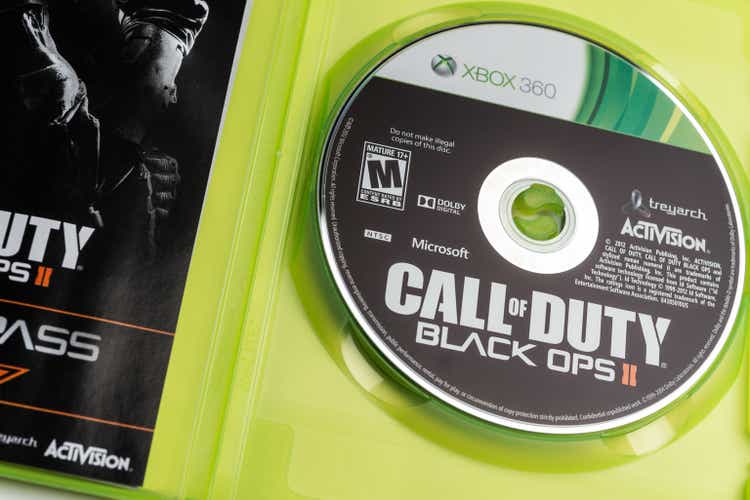shaunl
Microsoft’s (MSFT) attempt to buy Activision Blizzard (NASDAQ:ATVI) is a story that is going to run and run.
Back in January, the agreement was reached between the two companies. Microsoft was cash-rich, while Activision Blizzard was suffering from a reputational scandal. Microsoft pounced, and the proposed deal was struck at $95 in cash for each Activision Blizzard share.
The rationale is easy enough to understand: Microsoft already controls video game platforms through Windows and the Xbox 360 console, publishes video games through Xbox Game Studios, and sells games through the Microsoft Store and the Xbox Store.
Microsoft also owns important game titles such as Minecraft, Halo, Flight Simulator, and Forza, but is not considered a leader when it comes to game development and game publishing.
Minecraft Earth (Photo by Mika Baumeister on Unsplash)
The merger with Activision will change this, giving Microsoft a more impressive roster of gaming titles.
But naturally, given the regulatory environment, Microsoft is keen to play down its influence in the gaming industry.
In a New Zealand regulatory filing (dated 13 June 2022), Microsoft says:
Regardless of how the market is defined, Microsoft and Activision Blizzard are small players in a highly fragmented publishing space.
Microsoft does have a point here – neither company is a true giant when it comes to gaming revenues. The true giants are Tencent (OTCPK:TCEHY), Sony (SONY) and Apple (AAPL).
But it’s still a stretch to call either company “small”: both Microsoft and Activision Blizzard have a place in the top 10 publicly-listed companies for gaming revenue (as compiled by gaming industry analysts Newzoo). Both companies are bigger than Nintendo (OTCPK:NTDOY)!
Would Microsoft threaten Call of Duty?
A possible regulatory concern might be: what if Microsoft makes Call of Duty unplayable, except on Windows and Xbox?
In the New Zealand regulatory filing, Microsoft asserts once again that it will not do this:
Microsoft has demonstrated that it is not withdrawing content from other platforms, having made multiple public statements that it will continue to make Call of Duty and other popular Activision Blizzard titles available on PlayStation through the term of any existing agreement and beyond. Microsoft has also publicly stated that it is interested in taking similar steps to support Nintendo’s platform.
How the regulators will view this is anyone’s guess, but my own guess is that they will agree: if Microsoft shuttered off its games from rival consoles, it would be shooting itself in the foot.
Because in a world of increasing “crossplay” functionality, console and computer platforms are incentivised to cooperate and to allow their users to play against each other.
If Call of Duty could only be played on Xbox, for example, it would open the door for a new franchise to steal its crown as the pre-eminent first-person shooter (FPS). The lack of crossplay would be an enormous disadvantage against all competitors in the FPS space.
Indeed, Call of Duty’s Warzone series has always been a crossplay title, and crossplay is an important part of its identity.
This free-to-play series played a crucial role in the trend for bigger maps and more players in the same arena. As that trend continues, it’s important that the pool of available players is as big as possible – and that requires crossplay.
In summary, it would be strategically disastrous for Microsoft to restrict Call of Duty to Windows and Xbox only. We can only assume, without any degree of certainty, that the regulators will agree.
(Note that Activision Blizzard’s World of Warcraft title is a non-console game, so that these arguments are less relevant.)
Call of Duty is unique
While Microsoft gets many things right in its regulatory filing, it goes on to say:
…with respect to Activision Blizzard video games, there is nothing unique about the video games developed and published by Activision Blizzard that is a “must have” for rival PC and console video game distributors that could give rise to a foreclosure concern;
It’s true that other video game distributors don’t need to own these games. There is no sense in which any distributors needs to own any particular game.
But Microsoft can’t hide the fact that Activision Blizzard does have something unique when it comes to the Call of Duty franchise.
For nearly twenty years, Call of Duty has been building its reputation in the FPS category. Call of Duty: Modern Warfare was released in 2007, and completely changed expectations in the genre. Since then, there has been precious little relief for rival developers.
In recent years, there has been only one very successful rival: Tencent’s PUBG: Battlegrounds.
PUBG sold 75 million units on console and PC by the end of 2021, and is more popular than Call of Duty on mobile platforms (for context, Call of Duty has sold well in excess of 425 million units in total).
Playing PUBG on smartphone. (Photo by Screen Post on Unsplash)
Despite the competition from PUBG, 100 million players still turned up as active users for Activision in Q1 2022.
That number was down by 33% compared to the prior year. However, the timing of the approach from Microsoft supports my view that this is likely to be a temporary lull in Activision Blizzard’s fortunes.
In October of this year, Activision Blizzard is set to launch Call of Duty: Modern Warfare 2, the most eagerly anticipated title in the franchise since 2019 and one which has the potential to reboot the growth in monthly active users.
Why Call of Duty wins
With so many active players, Call of Duty benefits from enormous network effects: users go there because of the excitement of playing against this vast competitive field.
Leaving PUBG to one side, the other rivals in the FPS category don’t come anywhere close. EA’s Battlefield 2042 is a failure. Ubisoft’s Rainbow Six: Extraction is a niche pursuit.
Could Call of Duty eventually go the way of Battlefield and Rainbow Six? Of course, it’s possible. A very poorly-received launch of Modern Warfare 2, combined with additional investment from Tencent in the category, could lead to a changing of the guard.
But with millions of players turning up every day and testing new Call of Duty releases, Activision Blizzard has access to information that almost no other FPS developer has: they can see, instantly, what is working and what is not working. This is an enormous competitive advantage against smaller developers.
They can see what add-ons people want to buy, and they can see what maps people want to play. They get this information immediately and in better detail than their competitors.
What next for Activision Stock
If the deal gets past the Federal Trade Commission and $95 is paid out by the end of Microsoft’s fiscal year (June 2023), then Activision Blizzard shareholders will enjoy an 18.75% return over ten months.
According to Bloomberg, the Federal Trade Commission is reviewing the potential labor impacts of the deal.
My own best guess is that the FTC and other regulators will look at all of the competition from other console manufacturers, other game stores, and other game developers, and choose not to block the deal. But this is far from certain.
So what it if does block the deal, and Activision must remain a standalone entity?
Consensus forecasts suggest that Activision Blizzard will earn revenues of around $8 billion in the current year, rising to over $9 billion in 2023 (source: Stockopedia.com).
World of Warcraft: Burning Crusade (Photo by WTFast on Unsplash)
Modern Warfare 2 could easily spark a return to growth in monthly active users for the Call of Duty franchise. Meanwhile, World of Warcraft still has around six million active players per month (over one million every day), and appears to be mostly stable.
Activision Blizzard’s enterprise value is around $56 billion and, if the company hits its estimates next year, will earn over $3 billion in after-tax net income.
While the company is heavily concentrated in just a few titles, the quality and competitive position of the Call of Duty franchise is undeniable.
Given the company’s commanding position in the highly-coveted FPS category, plus a range of other high-quality titles, I believe that the EV/earnings multiple of less than 20x may represent reasonable value, even if the deal with Microsoft falls apart. There is no reason why Call of Duty can’t continue to grow for years to come, the jewel in the crown of Activision Blizzard’s games portfolio.


Be the first to comment